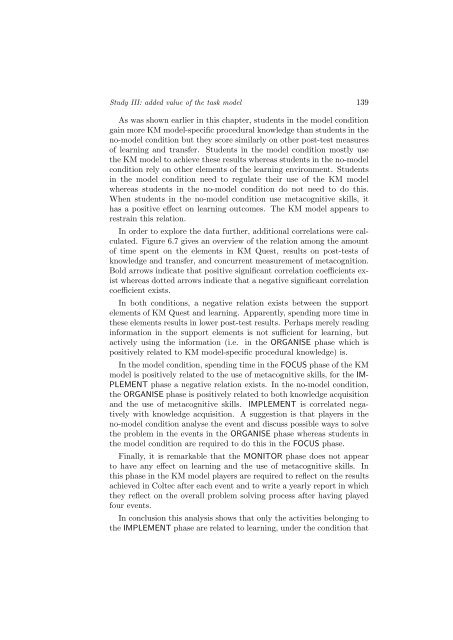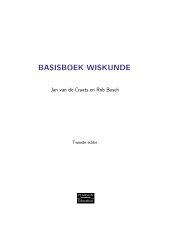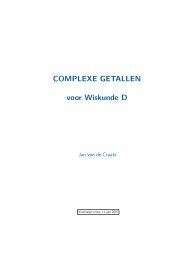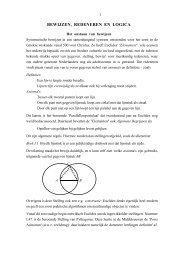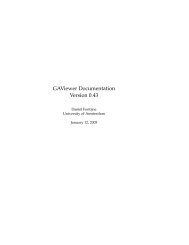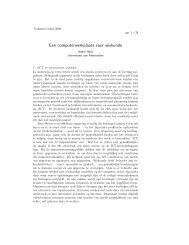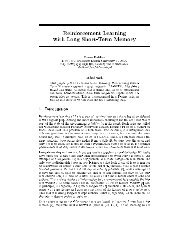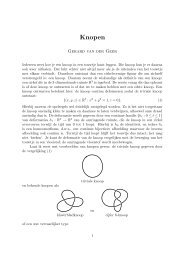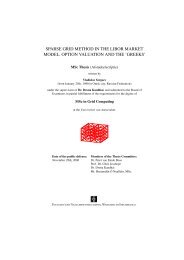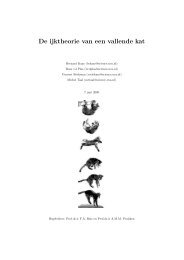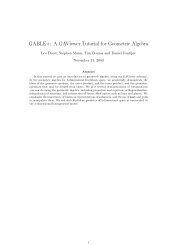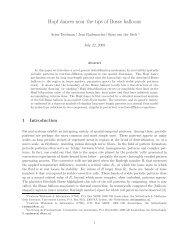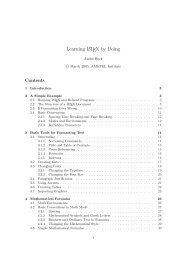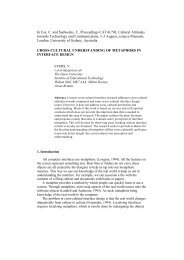The role of metacognitive skills in learning to solve problems
The role of metacognitive skills in learning to solve problems
The role of metacognitive skills in learning to solve problems
You also want an ePaper? Increase the reach of your titles
YUMPU automatically turns print PDFs into web optimized ePapers that Google loves.
Study III: added value <strong>of</strong> the task model 139<br />
As was shown earlier <strong>in</strong> this chapter, students <strong>in</strong> the model condition<br />
ga<strong>in</strong> more KM model-specific procedural knowledge than students <strong>in</strong> the<br />
no-model condition but they score similarly on other post-test measures<br />
<strong>of</strong> learn<strong>in</strong>g and transfer. Students <strong>in</strong> the model condition mostly use<br />
the KM model <strong>to</strong> achieve these results whereas students <strong>in</strong> the no-model<br />
condition rely on other elements <strong>of</strong> the learn<strong>in</strong>g environment. Students<br />
<strong>in</strong> the model condition need <strong>to</strong> regulate their use <strong>of</strong> the KM model<br />
whereas students <strong>in</strong> the no-model condition do not need <strong>to</strong> do this.<br />
When students <strong>in</strong> the no-model condition use <strong>metacognitive</strong> <strong>skills</strong>, it<br />
has a positive effect on learn<strong>in</strong>g outcomes. <strong>The</strong> KM model appears <strong>to</strong><br />
restra<strong>in</strong> this relation.<br />
In order <strong>to</strong> explore the data further, additional correlations were calculated.<br />
Figure 6.7 gives an overview <strong>of</strong> the relation among the amount<br />
<strong>of</strong> time spent on the elements <strong>in</strong> KM Quest, results on post-tests <strong>of</strong><br />
knowledge and transfer, and concurrent measurement <strong>of</strong> metacognition.<br />
Bold arrows <strong>in</strong>dicate that positive significant correlation coefficients exist<br />
whereas dotted arrows <strong>in</strong>dicate that a negative significant correlation<br />
coefficient exists.<br />
In both conditions, a negative relation exists between the support<br />
elements <strong>of</strong> KM Quest and learn<strong>in</strong>g. Apparently, spend<strong>in</strong>g more time <strong>in</strong><br />
these elements results <strong>in</strong> lower post-test results. Perhaps merely read<strong>in</strong>g<br />
<strong>in</strong>formation <strong>in</strong> the support elements is not sufficient for learn<strong>in</strong>g, but<br />
actively us<strong>in</strong>g the <strong>in</strong>formation (i.e. <strong>in</strong> the ORGANISE phase which is<br />
positively related <strong>to</strong> KM model-specific procedural knowledge) is.<br />
In the model condition, spend<strong>in</strong>g time <strong>in</strong> the FOCUS phase <strong>of</strong> the KM<br />
model is positively related <strong>to</strong> the use <strong>of</strong> <strong>metacognitive</strong> <strong>skills</strong>, for the IM-<br />
PLEMENT phase a negative relation exists. In the no-model condition,<br />
the ORGANISE phase is positively related <strong>to</strong> both knowledge acquisition<br />
and the use <strong>of</strong> <strong>metacognitive</strong> <strong>skills</strong>. IMPLEMENT is correlated negatively<br />
with knowledge acquisition. A suggestion is that players <strong>in</strong> the<br />
no-model condition analyse the event and discuss possible ways <strong>to</strong> <strong>solve</strong><br />
the problem <strong>in</strong> the events <strong>in</strong> the ORGANISE phase whereas students <strong>in</strong><br />
the model condition are required <strong>to</strong> do this <strong>in</strong> the FOCUS phase.<br />
F<strong>in</strong>ally, it is remarkable that the MONITOR phase does not appear<br />
<strong>to</strong> have any effect on learn<strong>in</strong>g and the use <strong>of</strong> <strong>metacognitive</strong> <strong>skills</strong>. In<br />
this phase <strong>in</strong> the KM model players are required <strong>to</strong> reflect on the results<br />
achieved <strong>in</strong> Coltec after each event and <strong>to</strong> write a yearly report <strong>in</strong> which<br />
they reflect on the overall problem solv<strong>in</strong>g process after hav<strong>in</strong>g played<br />
four events.<br />
In conclusion this analysis shows that only the activities belong<strong>in</strong>g <strong>to</strong><br />
the IMPLEMENT phase are related <strong>to</strong> learn<strong>in</strong>g, under the condition that


